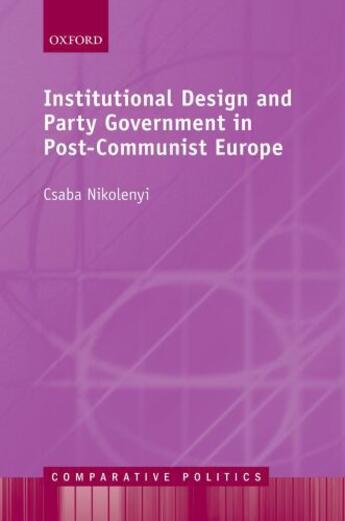-
Nombre de pages : (-)
-
Collection :
(-)
-
Genre :
(-)
-
Thème :
Non attribué
-
Prix littéraire(s) :
(-)
Résumé:
This books examines the institutional foundations of coalition government in the ten post-communist democracies of Eastern and Central Europe for the 1990-2010 period: Bulgaria, the Czech Republic, Estonia, Hungary, Latvia, Lithuania, Poland, Romania, Slovakia, and Slovenia. Its central argument... Voir plus
This books examines the institutional foundations of coalition government in the ten post-communist democracies of Eastern and Central Europe for the 1990-2010 period: Bulgaria, the Czech Republic, Estonia, Hungary, Latvia, Lithuania, Poland, Romania, Slovakia, and Slovenia. Its central argument is that differences in the arrangement of political institutions systematically explain variations in patterns of multi-party government across these states. The book starts with the premise that electoral systems and constitutional provisions about the powers, the structure, and the relationship between parliament and the presidency determine the degree to which political power is dispersed or concentrated in the political system. On the basis of these institutional features, three groups of states are distinguished with regard to their degree of power concentration; the substantive chapters of the book demonstrate how these institutional combinations and differences shape three specific facets of party government which capture the main stages of the lifecycle of coalitions governments: the formation of electoral coalitions, government formation and government duration. Specifically, three comparative chapters assess the impact of institutional power concentration on the size of electoral coalitions; the likelihood that political parties form a minority government; and the number of days that a government lasts in office. The main finding of the book is that power concentration matters: political parties in those democracies where institutions are designed to concentrate political power tend to form large electoral coalitions, they tend to form majority rather than undersized governments, and they build more durable cabinets. In addition, the book contains a detailed case study of government formation in Hungary and a previously unstudied comparison of indirect presidential elections in four states: the Czech Republic, Estonia, Hungary and Latvia.
Comparative Politics is a series for students, teachers, and researchers of political science that deals with contemporary government and politics. Global in scope, books in the series are characterised by a stress on comparative analysis and strong methodological rigour. The series is published in association with the European Consortium for Political Research. For more information visit: www.ecprnet.eu.
Donner votre avis














